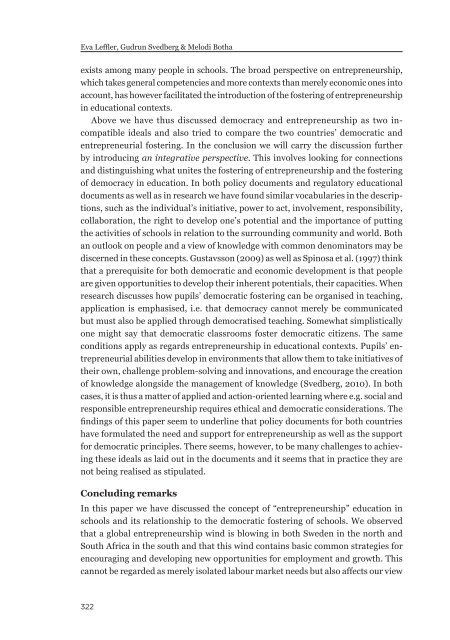A global entrepreneurship wind is supporting or ... - Umeå universitet
A global entrepreneurship wind is supporting or ... - Umeå universitet
A global entrepreneurship wind is supporting or ... - Umeå universitet
You also want an ePaper? Increase the reach of your titles
YUMPU automatically turns print PDFs into web optimized ePapers that Google loves.
Eva Leffler, Gudrun Svedberg & Melodi Botha<br />
ex<strong>is</strong>ts among many people in schools. The broad perspective on <strong>entrepreneurship</strong>,<br />
which takes general competencies and m<strong>or</strong>e contexts than merely economic ones into<br />
account, has however facilitated the introduction of the fostering of <strong>entrepreneurship</strong><br />
in educational contexts.<br />
Above we have thus d<strong>is</strong>cussed democracy and <strong>entrepreneurship</strong> as two incompatible<br />
ideals and also tried to compare the two countries’ democratic and<br />
entrepreneurial fostering. In the conclusion we will carry the d<strong>is</strong>cussion further<br />
by introducing an integrative perspective. Th<strong>is</strong> involves looking f<strong>or</strong> connections<br />
and d<strong>is</strong>tingu<strong>is</strong>hing what unites the fostering of <strong>entrepreneurship</strong> and the fostering<br />
of democracy in education. In both policy documents and regulat<strong>or</strong>y educational<br />
documents as well as in research we have found similar vocabularies in the descriptions,<br />
such as the individual’s initiative, power to act, involvement, responsibility,<br />
collab<strong>or</strong>ation, the right to develop one’s potential and the imp<strong>or</strong>tance of putting<br />
the activities of schools in relation to the surrounding community and w<strong>or</strong>ld. Both<br />
an outlook on people and a view of knowledge with common denominat<strong>or</strong>s may be<br />
d<strong>is</strong>cerned in these concepts. Gustavsson (2009) as well as Spinosa et al. (1997) think<br />
that a prerequ<strong>is</strong>ite f<strong>or</strong> both democratic and economic development <strong>is</strong> that people<br />
are given opp<strong>or</strong>tunities to develop their inherent potentials, their capacities. When<br />
research d<strong>is</strong>cusses how pupils’ democratic fostering can be <strong>or</strong>gan<strong>is</strong>ed in teaching,<br />
application <strong>is</strong> emphas<strong>is</strong>ed, i.e. that democracy cannot merely be communicated<br />
but must also be applied through democrat<strong>is</strong>ed teaching. Somewhat simpl<strong>is</strong>tically<br />
one might say that democratic classrooms foster democratic citizens. The same<br />
conditions apply as regards <strong>entrepreneurship</strong> in educational contexts. Pupils’ entrepreneurial<br />
abilities develop in environments that allow them to take initiatives of<br />
their own, challenge problem-solving and innovations, and encourage the creation<br />
of knowledge alongside the management of knowledge (Svedberg, 2010). In both<br />
cases, it <strong>is</strong> thus a matter of applied and action-<strong>or</strong>iented learning where e.g. social and<br />
responsible <strong>entrepreneurship</strong> requires ethical and democratic considerations. The<br />
findings of th<strong>is</strong> paper seem to underline that policy documents f<strong>or</strong> both countries<br />
have f<strong>or</strong>mulated the need and supp<strong>or</strong>t f<strong>or</strong> <strong>entrepreneurship</strong> as well as the supp<strong>or</strong>t<br />
f<strong>or</strong> democratic principles. There seems, however, to be many challenges to achieving<br />
these ideals as laid out in the documents and it seems that in practice they are<br />
not being real<strong>is</strong>ed as stipulated.<br />
Concluding remarks<br />
In th<strong>is</strong> paper we have d<strong>is</strong>cussed the concept of “<strong>entrepreneurship</strong>” education in<br />
schools and its relationship to the democratic fostering of schools. We observed<br />
that a <strong>global</strong> <strong>entrepreneurship</strong> <strong>wind</strong> <strong>is</strong> blowing in both Sweden in the n<strong>or</strong>th and<br />
South Africa in the south and that th<strong>is</strong> <strong>wind</strong> contains basic common strategies f<strong>or</strong><br />
encouraging and developing new opp<strong>or</strong>tunities f<strong>or</strong> employment and growth. Th<strong>is</strong><br />
cannot be regarded as merely <strong>is</strong>olated labour market needs but also affects our view<br />
322

















